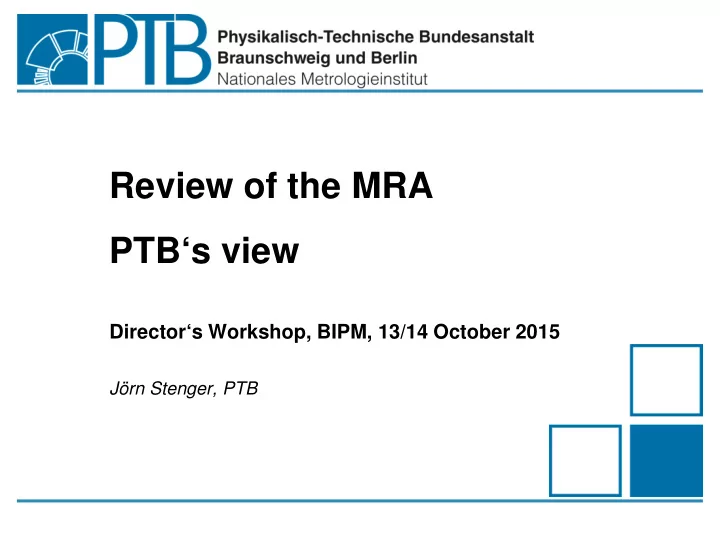

Review of the MRA PTB‘s view Director‘s Workshop, BIPM, 13/14 October 2015 Jörn Stenger, PTB
Participation in key comparisons Germany USA UK France Japan Korea China Russia Australia Italy Seite 2
Observations The MRA is a great success, however • The resources needed to maintain the MRA has reached limits • There is no mechanism to limit the number of CMC’s and comparisons. It is up to the individual NMI and DI to decides about its participation • The number of NMI is limited to one per country, but there is no mechanism to limit the number of DI’s • There are no built-in mechanisms to stabilize the MRA • There are rules and CIPM recommendations, but no enforcement tools • Possible tension: open-access infrastructure vs. commercial interest of service provision Seite 3
Guiding considerations for future developments Key comparisons − are matter of NMI‘s and DI‘s on highest, primary level; deliver KC reference values for regional comparisons multiplication − comparisons on international or regional level underpin CMC‘s generically CMC‘s CMC‘s − address capabilities under international review and recognition multiplication − underpin a larger number of services generically Services − are matter of each institute Services − are not subject to international review − are covered by the QM system, which is reviewed by RMO Seite 4
Guiding considerations for future developments Long-term success of the MRA is: • Quality more than quantity • The highest-level metrology backbone requires the highest level of integrity • Reliability, robustness, availability • Use multiplication for dissemination • Provide additional support for emerging labs Seite 5
Key suggestions and proposals • MRA core text does not need modification • Freedom of choice between the equivalent options of self-declaration and accreditation must be maintained • Enforcement of MRA requirements − Quality thresholds for participation in international KC’s − Secondary standards shall be excluded from international KC’s; comparisons within RMO’s for proof of competences of NMI’s and DI’s holding secondary standards − Acceptance of all DI’s (not only supranational bodies) shall require CIPM approval, based on recommendations of the RMO’s; the CIPM shall have the right to withdraw approval • Introduce a top-down element for setting the scope of CMC’s and comparisons and participation in KC, e.g. an NMI director’s platform Seite 6
Further specific suggestions and proposals • CMC’s may be not maintained without real, associated customers services after a given period of time • CMC entries on the basis of a validation report to be presented to the relevant TC/CC, if there are no partners for KC’s • Chemical, biological and bio-technological quantities need a different approach, revision of technical guides is necessary. Seite 7
Physikalisch-Technische Bundesanstalt Braunschweig und Berlin Bundesallee 100 38116 Braunschweig Dr. Jörn Stenger Member of the Presidential Board Telefon: 0531 592-3000 E-Mail: joern.stenger@ptb.de www.ptb.de October 2015
Recommend
More recommend